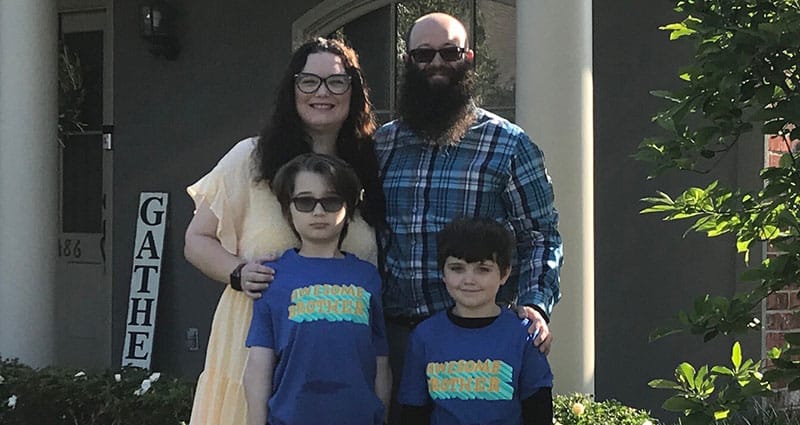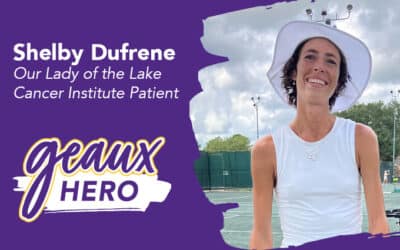Karen Tantzen knew something was wrong just minutes after she received a Johnson & Johnson COVID-19 vaccine in March 2021. The injection had stung, unlike her annual flu shots. One of her arms began hurting. The pain traveled across her chest. She felt a tickle in her throat, similar to a sinus drip. Then, her throat became swollen and it became hard to breathe.
At the hospital, doctors determined Tantzen had an anaphylactic reaction to the injection. Her personal doctor suggested she speak to an allergist, which led her to Dr. Kathryn Neupert at Our Lady of the Lake.
By the time Tantzen met with Dr. Neupert for the first time, she was concerned and on edge about the whole situation. The feeling of being in pain and struggling to breathe made her afraid of future vaccines for herself and her two sons. Her generalized anxiety disorder also brought about a wealth of emotions.
“I’ve found that some doctors will dismiss concerns and think it’s only because of anxiety, but Dr. Neupert wasn’t like that at all,” Tantzen said. “I explained to her what had happened and how scared I was, and I felt like she truly listened to me. She made eye contact with me. She wasn’t looking anywhere else. She was actively involved in the conversation. I felt seen. She cared about what I had to say.”
Tantzen said Dr. Neupert assured her that her concerns were legitimate. She also encouraged Tantzen to undergo testing to determine what exactly had caused the reaction and how to prevent similar situations in the future.
“Anytime someone has a reaction, you want to get the full story of what exactly happened,” Dr. Neupert explained. “In the allergy world, our biggest tool is the history. I tend to go into a lot of detail to understand what type of reaction occurred and what the treatment for it could be. A reaction could be a side effect, a true allergic reaction or an adverse experience that might not be an allergy. That’s why our best tool is getting a really detailed history of what the patient experienced.”
Ultimately, Dr. Neupert and her team were able to identify the exact cause of Tantzen’s anaphylactic reaction. Most importantly to Tantzen, Neupert explained that allergies are not genetic or inherited, so there was no reason to think either of her children would have a similar reaction to a COVID-19 vaccine. The conversation was so reassuring that Tantzen had her sons vaccinated once the shots were available for their age groups. Tantzen also received a COVID-19 booster shot under Neupert’s supervision. Neither Tantzen nor her children had any other negative effects.
“It’s completely understandable that if someone has an uncomfortable or dangerous experience, they don’t want to go through that again,” Dr. Neupert said. “Our job as allergists is to determine if they can go through a similar event again in a safe way. If we feel based on the person’s history and experience that it would be potentially life-threatening, we would not recommend it. But, if we can allow them to receive a vaccine in a safe way, that is the best case scenario. It really is all determined by the details of the reaction and our expertise in how reactions work.”
Tantzen said she feels secure in her decisions for herself and her children. But, best of all, she was heartened to work with a specialist who was attentive and thorough.
“The whole experience was comforting and I felt like my concerns were legitimized,” Tantzen said. “Yes, I have anxiety, but Dr. Neupert assured me that anybody would feel anxious after having something so rare and so severe happen to them after. I felt like my concerns were validated.”
Dr. Neupert said part of her philosophy as a physician is to listen to each patient’s individual experiences before making any decisions or assessments.
“Anytime someone comes to us, especially with an adverse reaction, you have to find out what it meant for them,” she explained. “Everyone is different and people often have very different types of reactions. You never want to dismiss anyone’s symptoms or experiences. I believe that listening is the first step to finding out what occurred and how it has impacted them.”




